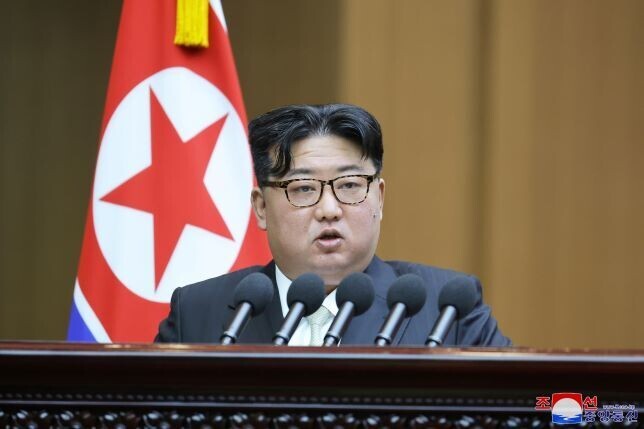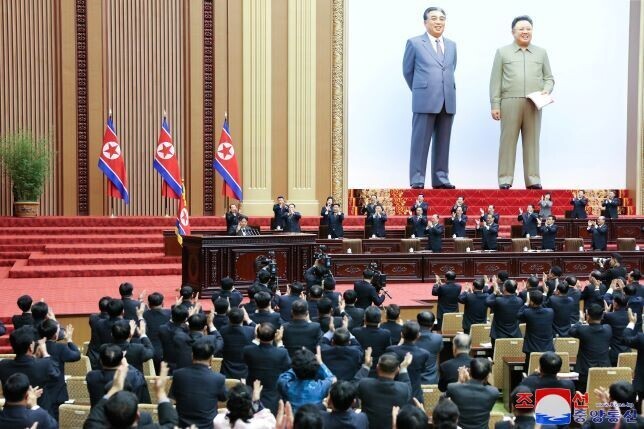hankyoreh
Links to other country sites 다른 나라 사이트 링크
N. Korea’s Kim moves to drop reunification, reconciliation with South from constitution

North Korean leader Kim Jong-un stressed that South Korea ought to be defined in the North’s constitution as its “invariable principal enemy.” In effect, Kim is ramping up efforts to institute a closed-door policy toward South Korea that amounts to completely shutting down inter-Korean relations.
North Korea’s state-run Rodong Sinmun reported Tuesday that Kim described South Korea as the North’s “primary foe and invariable principal enemy” during a speech at a session of the Supreme People’s Assembly, which was held at Mansudae Assembly Hall, in Pyongyang, on Monday.
“We should also [. . .] completely eliminate such concepts as ‘reunification,’ ‘reconciliation’ and ‘fellow countrymen’ from the national history of our Republic,” Kim was also quoted as saying.
The Supreme People’s Assembly is North Korea’s legislative body, equivalent to South Korea’s National Assembly.
Kim proposed that North Korea’s constitution be amended to reflect a fundamental change of course in North Korea’s relations with the South, which he described as the relations between two hostile states in a plenary session of the Eighth Central Committee of the Workers’ Party of Korea at the end of 2023. That amounts to an attempt to totally cut off inter-Korean relations and formalize a “two Koreas” narrative that revises the unification line held by previous North Korean leaders, Kim Il-sung and Kim Jong-il.
Such an attempt would fundamentally redefine North Korea’s state identity as an independent socialist state, rather than a divided state seeking reunification, which would mandate changes in North Korea’s foreign strategy, including its policy toward the South.
At Kim’s direction, the Supreme People’s Assembly unanimously adopted a resolution stating the following: “The Committee for the Peaceful Reunification of the Country, the National Economic Cooperation Bureau and the Kumgangsan International Tourism Administration, tools which existed for North-South dialogue, negotiations and cooperation, are abolished.”
“Today the Supreme People’s Assembly newly legalized the policy of our Republic toward the South on the basis of putting an end to the nearly 80 year-long history of inter-Korean relations and recognizing the two states both existing [on] the Korean Peninsula,” Kim remarked.
“It is the final conclusion drawn from the bitter history of [. . .] inter-Korean relations that we cannot go along the road of national restoration and reunification together with the ROK clan that [. . . dreamed] of the ‘collapse of our government’ and ‘unification by absorption,’ and lost compatriotic consciousness, getting more vicious and arrogant in the madcap confrontational racket,” Kim said, proposing the need “to revise some contents of the Constitution of the DPRK.”
“I think it is right to specify in the relevant paragraph of our constitution that such linguistic remnants misinterpreting the North and the South as fellow countrymen as ‘3,000-ri tapestry-like land’ and ‘80 million compatriots’ are not used in the political, ideological, mental and cultural life of our people, and that education should be intensified to instill into them the firm idea that [the] ROK is their primary foe and invariable principal enemy,” he emphasized.
Kim criticized the South Korean government as representing a “servile state” for the US and as being “a group of outsiders’ top-class stooges.”
South Korean President Yoon Suk-yeol responded in a Cabinet meeting Tuesday at his office, in Yongsan, Seoul, by criticizing the North Korean regime for “openly acknowledging that it’s an anti-national and anti-historical organization.”

A spokesperson for the US State Department expressed disappointment in North Korea’s hostile remarks and voiced the belief that inter-Korean cooperation is essential for realizing lasting peace on the Korean Peninsula.
Along with defining South Korea as a hostile state and “principal enemy,” Kim Jong-un proposed a different course from the unification line held by his grandfather Kim Il-sung. For example, Kim remarked that “it is necessary to delete such expressions in the constitution as ‘northern half’ and ‘independence, peaceful reunification and great national unity.’”
“Independence, peaceful reunification and great national unity” are the three principles of national reunification that were specified in the July 4 South-North Statement, the first agreement between the South and North Korean authorities since the division of the peninsula. That agreement was reached following an “indirect summit” attended by envoys of South Korean President Park Chung-hee and North Korean leader Kim Il-sung in 1972. Thus, Kim Jong-un has basically rejected the principles of unification that both sides have agreed upon for more than 50 years.
Kim also called for the removal of the Monument to the Three-Point Charter for National Reunification, which was installed on Unification Street in Pyongyang’s Rangrang District in August 2001, shortly after the first inter-Korean summit in history, on orders from the then North Korean leader, Kim Jong-il. Kim Jong-un referred to the monument as an “eyesore.”
Amid this string of belligerent remarks, Kim rejected the idea of a preemptive attack, declaring that North Korea “will never unilaterally unleash a war if the enemies do not provoke us.”
“We can specify in our constitution the issue of completely occupying, subjugating and reclaiming the ROK and annex[ing] it as a part of the territory of our Republic in case [. . .] a war breaks out on the Korean Peninsula,” he added. “If the enemies ignite a war, our Republic will resolutely punish the enemies by mobilizing all its military forces including nuclear weapons.”
That echoed his remarks in the party plenum at the end of the year calling for North Korea to be prepared to subjugate the territory of South Korea in the event of a war. Kim is basically blustering that he’s willing to go nuclear if attacked, though he doesn’t intend to attack first.
In the same speech, Kim declared the Northern Limit Line to be illegal and said he doesn’t intend to respect it.
“We should take strict stepwise measures to thoroughly block all the channels of North-South communication along the border, including [. . .] physically and completely cutting off the railway tracks [on] our side,” Kim said. “As the southern border of our country has been clearly drawn, the illegal ‘northern limit line’ and any other boundary can never be tolerated, and if the ROK violates even 0.001 mm of our territorial land, air and waters, it will be considered a war provocation.”
While Kim packaged his closed-door policy toward South Korea and the severing of inter-Korean relations in bellicose rhetoric, several analysts in Korea and overseas regard the remarks as having been largely defensive in nature and fundamentally aimed at preventing “unification by absorption.”
Rüdiger Frank, a professor at the University of Vienna who was born in East Germany and studied at Kim Il Sung University, described Kim Jong-un’s new line as a “de-risking strategy” in an article posted at 38 North, a website providing analysis of Korean Peninsula affairs. Frank said he was reminded of how East Germany had shifted to a “two countries” line in response to West Germany’s “special relationship” approach, even deleting a phrase about unification from its constitution in 1974.
But simplistic comparisons should be avoided between the two countries, since North Korea is a nuclear-armed state while East Germany was not. Kim’s new line is grounded in a strategy of maintaining and developing his regime while preventing “unification by absorption” through his nuclear arsenal and the severing of inter-Korean relations.
Experts in South Korea noted that the course of inter-Korean relations may depend on how the Yoon administration responds and spoke of a critical need for a carefully considered and prudent response by the government.
“We should examine Kim Jong-un’s narrative on severing inter-Korean relations separately from his rhetoric about war as we craft our response,” said Kim Yeon-chul, a professor at Inje University who served as minister of unification under President Moon Jae-in.
“The risk of an unforeseen military clash between South and North Korea escalating into war is greater than at any other time. The governments of South Korea and the US need to pay particular attention to managing the crisis,” said Moon Chung-in, a professor emeritus at Yonsei University.
By Lee Je-hun, senior staff writer
Please direct questions or comments to [english@hani.co.kr]

Editorial・opinion
![[Guest essay] Preventing Korean Peninsula from becoming front line of new cold war [Guest essay] Preventing Korean Peninsula from becoming front line of new cold war](https://flexible.img.hani.co.kr/flexible/normal/500/300/imgdb/original/2024/0507/7217150679227807.jpg) [Guest essay] Preventing Korean Peninsula from becoming front line of new cold war
[Guest essay] Preventing Korean Peninsula from becoming front line of new cold war![[Column] The state is back — but is it in business? [Column] The state is back — but is it in business?](https://flexible.img.hani.co.kr/flexible/normal/500/300/imgdb/original/2024/0506/8217149564092725.jpg) [Column] The state is back — but is it in business?
[Column] The state is back — but is it in business?- [Column] Life on our Trisolaris
- [Editorial] Penalties for airing allegations against Korea’s first lady endanger free press
- [Editorial] Yoon must halt procurement of SM-3 interceptor missiles
- [Guest essay] Maybe Korea’s rapid population decline is an opportunity, not a crisis
- [Column] Can Yoon steer diplomacy with Russia, China back on track?
- [Column] Season 2 of special prosecutor probe may be coming to Korea soon
- [Column] Park Geun-hye déjà vu in Yoon Suk-yeol
- [Editorial] New weight of N. Korea’s nuclear threats makes dialogue all the more urgent
Most viewed articles
- 1[Guest essay] Preventing Korean Peninsula from becoming front line of new cold war
- 2Yoon’s broken-compass diplomacy is steering Korea into serving US, Japanese interests
- 360% of young Koreans see no need to have kids after marriage
- 4[Reporter’s notebook] In Min’s world, she’s the artist — and NewJeans is her art
- 5After 2 years in office, Yoon’s promises of fairness, common sense ring hollow
- 6S. Korean first lady likely to face questioning by prosecutors over Dior handbag scandal
- 7AI is catching up with humans at a ‘shocking’ rate
- 8[Column] The state is back — but is it in business?
- 9[Column] Why Korea’s hard right is fated to lose
- 10‘Weddingflation’ breaks the bank for Korean couples-to-be